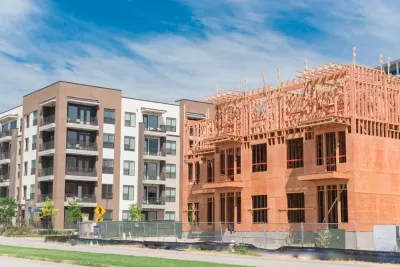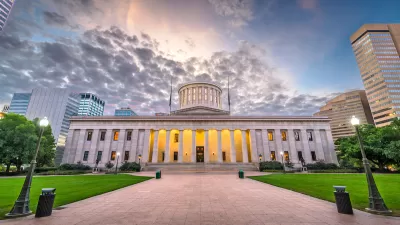A tax break approved by the Texas Legislature is delivering massive benefits to developers in the state, but advocates say the public isn't getting the promised return on investment.

Eric Dexheimer shares news of new analysis from researchers at the University of Texas School of Law about the effect of a 2015 tax break approved, ostensibly, for affordable housing projects in Texas. The tax break was approved in a last minute amendment "onto a densely worded bill updating finance statutes" by Republican State Senator Craig Estes and promised to deliver a financial boost to affordable housing developers.
"Since then, the one-sentence amendment has resulted in private developers receiving tens of millions of dollars in property tax breaks. It has saved them millions more in tax-free construction costs — all with scant benefit to the public," explains Dexheimer of the findings of the study released earlier this week.
In response to the quick popularity of the tax break for projects around the state, estimated by the report to deliver annual property tax breaks to apartment developers of close to $1 million per property on average, advocates are pressing back on the idea that the project is delivering promised low-income housing.
[T]hanks in part to a series of loopholes buried in the paperwork, the so-called affordable housing created in exchange for the 2015 tax breaks often is as expensive as market-rate apartments, said Heather Way, a professor at the Austin law school and lead author of the study. “The public’s just not getting the return on its investment,” she said.
John Henneberger, co-director of the Texas Low-Income Housing Information Service, is quoted in the article raising the stakes on Way's statement. Henneberger says the tax break is a misuse of taxpayer funds.
FULL STORY: How a big Texas tax break created not-so-affordable housing

Alabama: Trump Terminates Settlements for Black Communities Harmed By Raw Sewage
Trump deemed the landmark civil rights agreement “illegal DEI and environmental justice policy.”

Planetizen Federal Action Tracker
A weekly monitor of how Trump’s orders and actions are impacting planners and planning in America.

The 120 Year Old Tiny Home Villages That Sheltered San Francisco’s Earthquake Refugees
More than a century ago, San Francisco mobilized to house thousands of residents displaced by the 1906 earthquake. Could their strategy offer a model for the present?

In Both Crashes and Crime, Public Transportation is Far Safer than Driving
Contrary to popular assumptions, public transportation has far lower crash and crime rates than automobile travel. For safer communities, improve and encourage transit travel.

Report: Zoning Reforms Should Complement Nashville’s Ambitious Transit Plan
Without reform, restrictive zoning codes will limit the impact of the city’s planned transit expansion and could exclude some of the residents who depend on transit the most.

Judge Orders Release of Frozen IRA, IIJA Funding
The decision is a victory for environmental groups who charged that freezing funds for critical infrastructure and disaster response programs caused “real and irreparable harm” to communities.
Urban Design for Planners 1: Software Tools
This six-course series explores essential urban design concepts using open source software and equips planners with the tools they need to participate fully in the urban design process.
Planning for Universal Design
Learn the tools for implementing Universal Design in planning regulations.
Clanton & Associates, Inc.
Jessamine County Fiscal Court
Institute for Housing and Urban Development Studies (IHS)
City of Grandview
Harvard GSD Executive Education
Toledo-Lucas County Plan Commissions
Salt Lake City
NYU Wagner Graduate School of Public Service





























